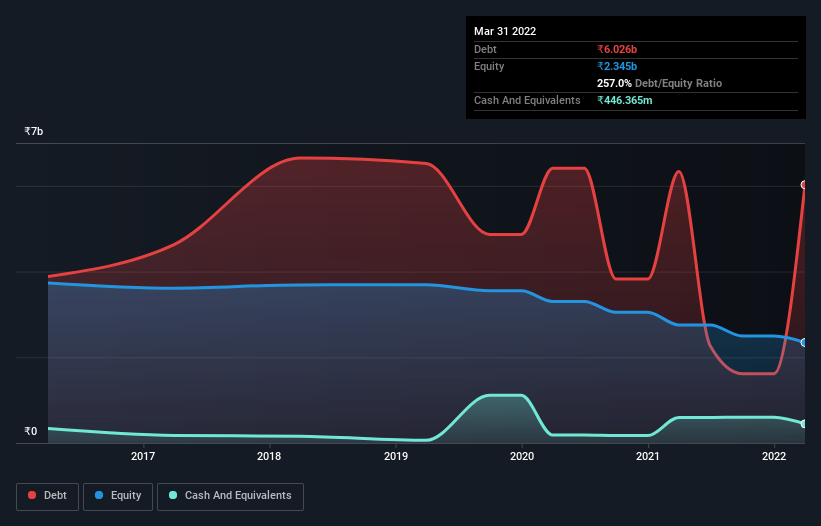The external fund manager backed by Berkshire Hathaway's Charlie Munger, Li Lu, makes no bones about it when he says 'The biggest investment risk is not the volatility of prices, but whether you will suffer a permanent loss of capital.' So it seems the smart money knows that debt - which is usually involved in bankruptcies - is a very important factor, when you assess how risky a company is. As with many other companies Vipul Limited (NSE:VIPULLTD) makes use of debt. But the real question is whether this debt is making the company risky.
When Is Debt Dangerous?
Debt and other liabilities become risky for a business when it cannot easily fulfill those obligations, either with free cash flow or by raising capital at an attractive price. If things get really bad, the lenders can take control of the business. However, a more common (but still painful) scenario is that it has to raise new equity capital at a low price, thus permanently diluting shareholders. Of course, plenty of companies use debt to fund growth, without any negative consequences. When we think about a company's use of debt, we first look at cash and debt together.
View our latest analysis for Vipul
What Is Vipul's Debt?
The image below, which you can click on for greater detail, shows that Vipul had debt of ₹6.03b at the end of March 2022, a reduction from ₹6.33b over a year. However, it also had ₹446.4m in cash, and so its net debt is ₹5.58b.

How Strong Is Vipul's Balance Sheet?
According to the last reported balance sheet, Vipul had liabilities of ₹14.9b due within 12 months, and liabilities of ₹1.20b due beyond 12 months. On the other hand, it had cash of ₹446.4m and ₹3.53b worth of receivables due within a year. So its liabilities total ₹12.1b more than the combination of its cash and short-term receivables.
This deficit casts a shadow over the ₹2.19b company, like a colossus towering over mere mortals. So we definitely think shareholders need to watch this one closely. At the end of the day, Vipul would probably need a major re-capitalization if its creditors were to demand repayment. The balance sheet is clearly the area to focus on when you are analysing debt. But it is Vipul's earnings that will influence how the balance sheet holds up in the future. So when considering debt, it's definitely worth looking at the earnings trend. Click here for an interactive snapshot.
In the last year Vipul wasn't profitable at an EBIT level, but managed to grow its revenue by 271%, to ₹1.4b. When it comes to revenue growth, that's like nailing the game winning 3-pointer!
Caveat Emptor
Despite the top line growth, Vipul still had an earnings before interest and tax (EBIT) loss over the last year. Indeed, it lost a very considerable ₹290m at the EBIT level. If you consider the significant liabilities mentioned above, we are extremely wary of this investment. Of course, it may be able to improve its situation with a bit of luck and good execution. But we think that is unlikely since it is low on liquid assets, and made a loss of ₹418m in the last year. So we think this stock is quite risky. We'd prefer to pass. There's no doubt that we learn most about debt from the balance sheet. But ultimately, every company can contain risks that exist outside of the balance sheet. For example, we've discovered 2 warning signs for Vipul (1 is significant!) that you should be aware of before investing here.
When all is said and done, sometimes its easier to focus on companies that don't even need debt. Readers can access a list of growth stocks with zero net debt 100% free, right now.
New: Manage All Your Stock Portfolios in One Place
We've created the ultimate portfolio companion for stock investors, and it's free.
• Connect an unlimited number of Portfolios and see your total in one currency
• Be alerted to new Warning Signs or Risks via email or mobile
• Track the Fair Value of your stocks
Have feedback on this article? Concerned about the content? Get in touch with us directly. Alternatively, email editorial-team (at) simplywallst.com.
This article by Simply Wall St is general in nature. We provide commentary based on historical data and analyst forecasts only using an unbiased methodology and our articles are not intended to be financial advice. It does not constitute a recommendation to buy or sell any stock, and does not take account of your objectives, or your financial situation. We aim to bring you long-term focused analysis driven by fundamental data. Note that our analysis may not factor in the latest price-sensitive company announcements or qualitative material. Simply Wall St has no position in any stocks mentioned.
About NSEI:VIPULLTD
Flawless balance sheet and slightly overvalued.
Market Insights
Community Narratives




